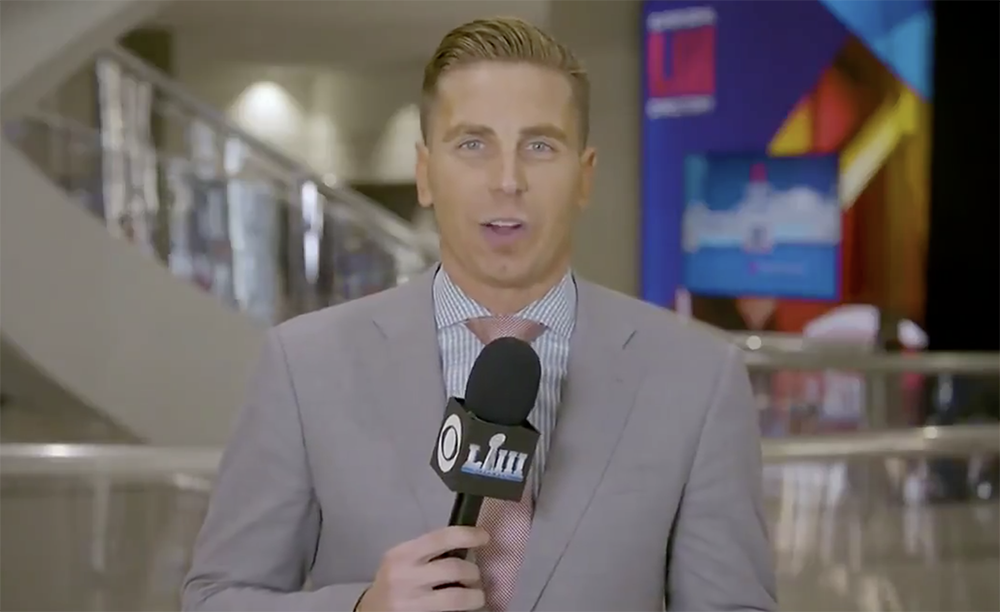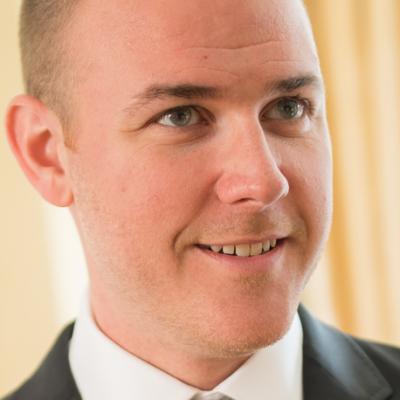
If you ever talk to CBS Sports reporter Evan Washburn at Eddie’s, sometimes reading a Baltimore magazine issue near the register, you’ll notice he doesn’t use any extraneous words—like, um, or uh—that the rest of typically use to fill the air.
“Word efficiency,” Washburn calls it. “I’ve made a calculated effort in everyday life not to use wasted words.”
It’s practice—for his TV job, one that this Sunday will bring Washburn’s voice and blond-haired likeness into the homes, computers, and phones of the more than 100 million people watching the Super Bowl—the biggest American television event of every year.
As an Annapolis native and Severn High grad who’s lived in Baltimore the last 10 years, Washburn is a sideline reporter for CBS. And, in the second Super Bowl game broadcast appearance of his TV career, he’ll work the New England Patriots beat when they face the Los Angeles Rams in Atlanta.
His job, as it has been working NFL games the last five years, is to deliver news and observations from the field, in short but informative 15 to 35 second bursts, and without getting in the way of the action.
And so, it helps to limit the ums and the likes in practice in a phone conversation with a friend, or with a stranger at the grocery store. It’s preparation for game day, if Tom Brady is injured and the world is curious to know what’s going on with him before play-by-play announcer Jim Nantz and analyst/football sage/former Dallas Cowboys quarterback Tony Romo call the next play.
“You have to get everything in quickly,” Washburn says. “For the whole game, you’re on the air probably for a grand total of two minutes. And you better get done with whatever you’re saying in a succinct way before they snap that ball, because that’s the time for the play-by-play and sometimes the analyst to talk and set things up.”
With all of the talk about Tom Brady and the Patriots' offense, @EvanWashburn explains that it's actually New England's defense that has morphed into the true identity of the team. pic.twitter.com/GNxupgxsqI — CBS Sports Network (@CBSSportsNet) January 29, 2019
A former lacrosse player at the University of Delaware, where he graduated in 2008, and a production assistant and intern with Comcast SportsNet, Washburn started with CBS eight years ago as a college lacrosse TV analyst and has quickly worked his way up the broadcast ladder. He earned a full-time job in 2014 and has since covered college football, March Madness, and NFL games, with a straightforward brand of reporting. He’s also worked locally with the Ravens.
He calls the job a privilege, and if he has any advice for those wanting to be in his position on sports’ grandest stage, it’s “You need to be ready at all times for when the luck happens,” because he was willing and able when the cable CBS Sports Network needed a fill-in analyst for a Princeton-Cornell lacrosse game in Ithaca, New York, (his first job with the company), and later when a college football reporting job opened just weeks before the season in the summer of 2012.
“[CBS] gave me opportunities when my paper resume by no means qualified me for it, which I always appreciated, because they saw something and ran with it,” he says. “Hopefully, up until this point, I haven’t really let them down.”
For the last four years, Washburn worked with CBS’ No. 2 NFL broadcast team and has gotten called up to the top squad each year the network has broadcast the Super Bowl, joining Tracy Wolfson on the sideline this year and in 2016 when the Denver Broncos and Carolina Panthers played in San Francisco.
This time around, as Washburn spoke before heading to Atlanta, he feels a little calmer—and not just because he’s more experienced. You’d think preparing for the greatest professional opportunity of your life in front of the largest television audience possible would be enough for one person to handle, but how about doing it while your newborn and wife rested in a neonatal intensive care unit?
“That was a wild time for me,” Washburn says of three years ago.
Two weeks before Super Bowl 50, Washburn’s wife, Kate, delivered their son, Hudson, a month early, on January 22, 2016, as blizzard hit home — and while Washburn was away in Denver preparing to broadcast the AFC championship game.
He was in a production meeting with Patriots coach Bill Belichick when his wife actually gave birth. Washburn’s phone kept buzzing, but he didn’t want to take it out and interrupt, you know, because he was trying to make a good impression with the coach who’s notoriously publicly curt with reporters.
He finally saw the texts from his dad, with pictures of his son, after the session with Belichick was done. Washburn called his wife, but they only spoke briefly before Brady walked in the conference room for his interview with CBS’ crew. After the game, Washburn flew home from Denver, but was only in Baltimore for four days before heading back across country to be in California for Super Bowl media week.
“My son, he was doing okay, but it was still a stressful, shocking time. It was all kind of a blur,” he says. “This time around, at least leading into the week, is much nicer. I have a lot more mental space to stop and smell the roses.”
Hudson is now 3, the family is settled at a home near Loyola University, and Washburn has several seasons of high-profile NFL coverage behind him. “It’s fun being in this community, and being out there at these big events and coming back to this place,” he says.
He describes the mechanics of his job—the things that are hidden to the TV viewer—as only a veteran could do. The analysts, like Romo, whose play-predicting ability is already becoming legendary, always have their microphones on. (“He couldn’t be a cooler dude,” Washburn says of Romo, with whom he worked for the first time during the Patriots-Kansas City Chiefs game two weeks ago.) Sideline reporters, meanwhile, need to be more proactive to get air time.
“There’s nothing in the broadcast, other than maybe one report before the game starts, that says Evan is going to get on the broadcast,” Washburn says. “You have to earn your way on the air. Everything falls on your shoulders to create your content.”
Oftentimes, those are injury reports from teams (“questionable to return,” and the like), but whether other information has value is left to his discretion.
If he has something to say, or context to add to what’s happening in the game, he’ll tap a button on his microphone to communicate off air with a producer, and when it comes time to report, suddenly Washburn will be speaking or appearing live to millions of people—trying to make his point without any of those wasted words.
“All of us like to voice our opinion on things, but that’s really just not the position,” he says. “Early on [in your career], you’re worried making sure that you’re doing a good job so that you can advance. But once you get comfortable with your status, it’s about the game. The game is going to dictate how much you get on the air, what you do on the air, and how people receive it. It’s always about the game.”
And none are bigger than this one.
